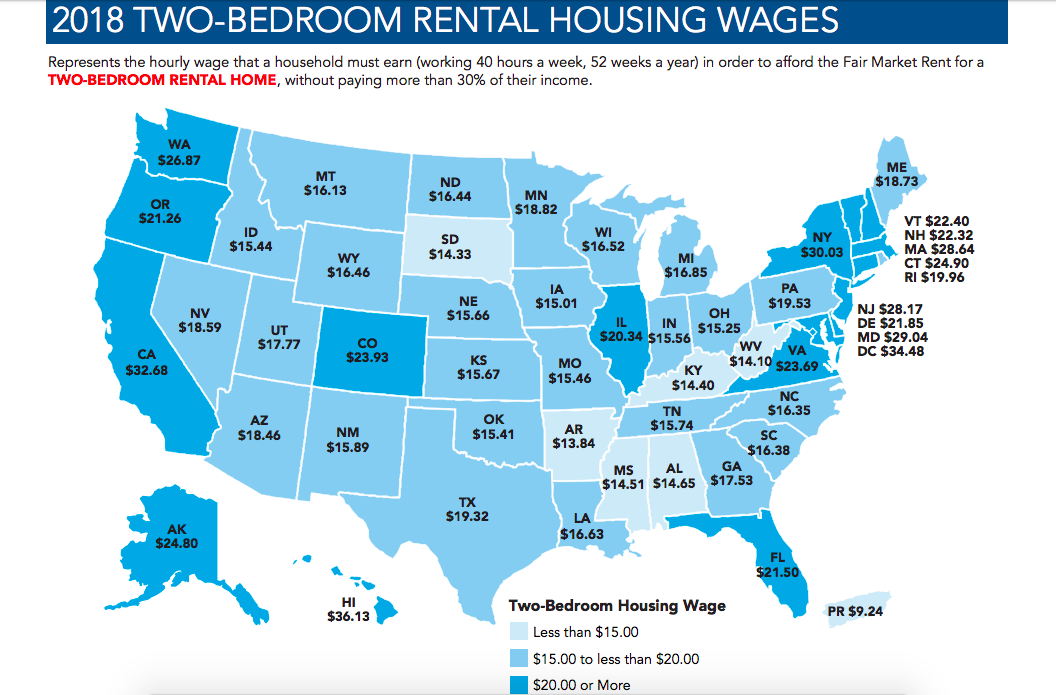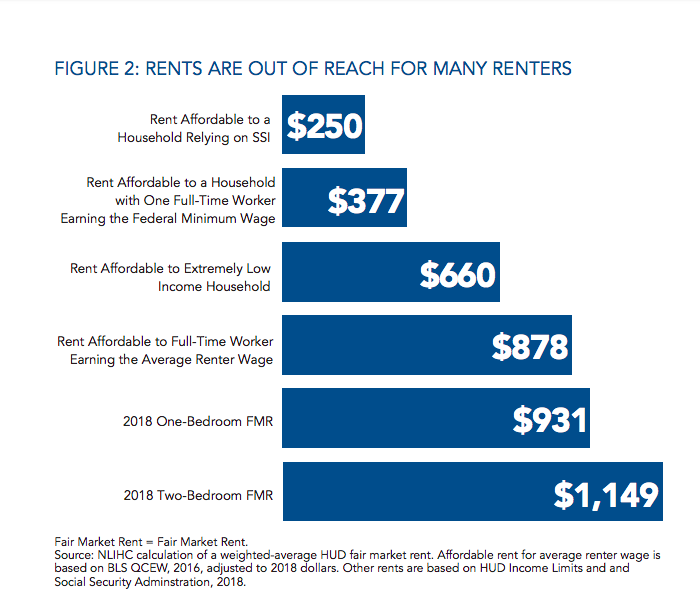Connecting state and local government leaders
“This will be a problem for the foreseeable future,” said Diane Yentel, president and CEO of the National Low Income Housing Coalition, which released a new study Wednesday.
In only 22 U.S. counties can a full-time, minimum-wage worker afford a one-bedroom rental without spending more than 30 percent of his or her income on rent, according to a new National Low Income Housing Coalition study.
All of those counties are in states with a minimum wage greater than $7.25 an hour, which is “important” but “not the silver-bullet solution for housing affordability,” researchers concluded.
There is no state where those same workers can afford a two-bedroom rental at what the federal government deems fair market rent, the report found.
“Even in places where advocates have successfully achieved minimum wage increases upward of $15 an hour, the housing costs in those communities are still out of reach,” said Diane Yentel, NLIHC president and CEO, on a Wednesday conference call.
For 2018, the report looked at rents across the country and concluded that a typical family would need to make $17.90 an hour to afford a modest, one-bedroom rental and $22.10 an hour to afford a two-bedroom. But exactly what was affordable depended on location, with a family in Arkansas needing at least $13.84 an hour in income, while Hawaiian households would require $36.13 an hour.
The metropolitan areas where workers would need even higher salaries to comfortably afford the rents aren’t a surprise. In San Francisco, a worker would need to make $60.02 an hour for a two-bedroom apartment, while the nearby Oakland-Fremont area in California would require $44.79 an hour. In Honolulu, Hawaii workers would need an income of $39.06 an hour and rents in Stamford-Norwalk, Connecticut require $38.19 an hour.

An average, extremely low-income household of four people earns $26,420 annually and can afford a maximum of $660 a month in rent, according to the study. Among extremely low-income renters, 71 percent spend more than half their incomes on housing.

The Trump administration in April proposed raising the rent paid by about 5 million public housing residents from 30 percent of their income to 35 percent and eliminating medical and childcare deductions—with the exception of elderly and disabled tenants. Rents would be reevaluated every three years instead of annually under the plan, Housing and Urban Development Secretary Ben Carson said in arguing the change would encourage tenants to seek better-paying jobs.
In total, the reforms would represent a 44 percent rent increase for households requiring housing assistance, and that’s in addition to proposed HUD budget cuts and work requirements. The rent hikes would require congressional approval.
Low wages, wage inequality and an affordable housing shortage across the country are the primary reasons modest rentals are out of reach for so many people, according to the report.
“Not only am I low income, I’m disabled also,” said Ted Hicks, an Arlington Partnership for Affordable Housing board member in Virginia. “That is a segment of the population that is becoming more visible but is not vested in the affordable housing options that are available.”
Tenants like Hicks, who receives Supplemental Security Income, find they’re blocked into certain types of housing and require vouchers.
While Congress increased HUD’s budget 10 percent in fiscal year 2018, funding for many programs remains below 2010 levels. NLIHC suggests increasing funding for tenant-based rental assistance programs like Housing Choice Vouchers, which cover the remaining cost—up to the local housing agency’s payment standard—after renters pay 30 percent of their incomes in the private market.
Only one in four households requiring rental assistance receives any currently, and generally that’s because they won some sort of housing lottery, Yentel said.
The federal Housing Trust Fund’s $266 million allocation is also “inadequate” for its mission of providing block grants to states for the creation and rehabilitation of affordable homes, according to NLIHC. The group says no less than $3.5 billion is needed.
Barring dramatic increases in federal investment, local government should allow the development of any housing but, in particular, focus on building multi-family housing in their communities, Yentel said. Her organization also urges governments to revisit zoning laws and do away with any restrictions limiting development and driving up home prices, noting that more housing supply will inherently cause costs to fall.
Market rate housing still isn’t a solution for the lowest-income households because it doesn’t filter down to a level of affordability they require, so rental assistance programs are also necessary.
President Trump’s proposed spending cuts for FY 2019 would “lead to the largest reduction in affordable housing and community development investments in decades” affecting more than 200,000 families, according to the study. Spending bills for HUD making their way through Congress currently do not include the administration’s cuts.
“Thankfully these proposed cuts have been rejected by Congress, but we have to do more,” Yentel said. “We lack only the political will to fund the solutions at the scale necessary.”
Dave Nyczepir is a News Editor at Government Executive’s Route Fifty and is based in Washington, D.C.

NEXT STORY: Chicago City Hall Pushes State to OK Use of Public Safety Drones




